| Srl | Item |
| 1 |
ID:
173945
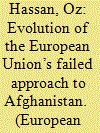

|
|
|
|
|
| Summary/Abstract |
This article provides a genealogical account of European actorness in Afghanistan. It argues that European agreement towards facilitating modernisation and development in Afghanistan was initiated with aid and trade, evolving into humanitarianism in the 1990s, and reconstruction and democratisation in the 2000s. The European Union has had a positive impact on Afghanistan, focusing on humanitarianism, but its multilateral and programme level approach to reconstruction and democratisation has failed to meet the EU’s stated objectives. By promoting the flawed “Bonn Model”, the EU is proportionally culpable for failed international attempts to reconstruct Afghanistan; even though the United States has been the primary international actor. Drawing a series of broader lessons, such as tensions between Atlantic solidarity and European integration, and the limitations of the European crisis management, the article demonstrates how European policy has been shaped by crises inside Afghanistan and the larger geopolitical crises these have generated. These have contemporary importance as history suggests that as the US withdraws its commitment to Afghanistan, the EU will have a very significant role in attempting to fill a humanitarian vacuum.
|
|
|
|
|
|
|
|
|
|
|
|
|
|
|
|
| 2 |
ID:
173942
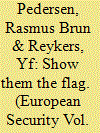

|
|
|
|
|
| Summary/Abstract |
Why do small states actively contribute to US- and NATO-led military operations? The small state literature has recently developed a novel explanation, referring to their dependency upon the alliance hegemon. The logic is that the small states aim to improve their status and reputation in order to remain relevant and to receive protection. This article contributes to this literature by moving away from this fear of abandonment motivation towards more positive status incitements. It shows how such status motives actually guide and shape small states’ military contributions in US- or NATO-led operations. It does so by using recent innovations in process-tracing methodology to create a status-seeking mechanism. Using the case of Belgium’s participation in the military coalition against ISIL, this article goes beyond the usual Scandinavian suspects in the small state literature and demonstrates that status motivations have relevance for a wider group of small states.
|
|
|
|
|
|
|
|
|
|
|
|
|
|
|
|
| 3 |
ID:
173946
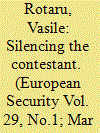

|
|
|
|
|
| Summary/Abstract |
This article analyses Russia’s endeavours in legitimising the annexation of Crimea in the eyes of the Western community. The paper argues that Russia’s strategy of “silencing” the international contestation has been focused on the use of the West’s “language” for the justification of contested actions. Starting from the assertion that the formulation of Russia’s foreign policy is determined by Western normative frameworks and by the West’s international behaviour, the article scrutinised Moscow’s official narrative after March 2014 by comparing it with the West’s arguments used in particular in the cases of NATO’s intervention in Yugoslavia and the recognition of Kosovo’s independence.
|
|
|
|
|
|
|
|
|
|
|
|
|
|
|
|
| 4 |
ID:
173941
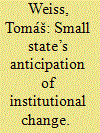

|
|
|
|
|
| Summary/Abstract |
Brexit will profoundly change politics in the European Union, and all countries will have to adjust to the new situation. But the issue is more pressing for small member states that are more dependent on international organisations than big states. This article studies how the institutional setting affects a small state’s preparations for Brexit in the areas of the common security and defence policy and internal market. Contrary to the expectations, it shows that the Czech Republic, the small state under scrutiny, has invested more effort into a preventive adjustment in the internal market policy than to the CSDP. This result is explained by the existence of alternative institutional frameworks that are expected to mitigate the impact of Brexit on EU’s security and defence policy. It also suggests that while small states profit from the existence of strong institutions, they also face the risk of unmitigated impact when these institutions change.
|
|
|
|
|
|
|
|
|
|
|
|
|
|
|
|
| 5 |
ID:
173944


|
|
|
|
|
| Summary/Abstract |
Perceptions of threat from Russia’s military activities in Ukraine and President Trump’s critical attitude towards NATO have put the idea of a common European army on the agenda of European politics. Do these strategic threat perceptions also influence public support for the creation of a common European army? Previous research has largely overlooked strategic threat perceptions as individual-level determinants of public support for a common European army. This article explores the empirical relationship between strategic threat perceptions and support for a common European army at the individual level of analysis with representative German survey data from 2018. The multivariate analysis shows that perceiving Russia’s military activities in Ukraine as a threat to Germany’s security, and U.S. foreign and security policy as a threat to the cohesion of NATO significantly increases support for the creation of a common European army, even when the influence of numerous other determinants is controlled for. The findings highlight the importance of considering strategic threat perceptions in future analyses of public opinion on European defence cooperation and integration.
|
|
|
|
|
|
|
|
|
|
|
|
|
|
|
|
| 6 |
ID:
173943
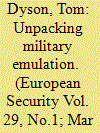

|
|
|
|
|
| Summary/Abstract |
Which organisational activities promote effective military emulation? Which variables facilitate and impede the emergence of these activities? Drawing upon the academic literatures on military change and management studies, as well as semi-structured interviews within the British and German militaries, this article identifies five key organisational activities which promote effective inter-organisational doctrinal learning. In doing so, the article improves understanding of the contribution that management studies can make to multi-disciplinary scholarship on military learning. The article examines the variables which facilitate the emergence of activities which support effective inter-organisational doctrinal learning through a case study of Bundeswehr doctrinal absorptive capacity during ISAF. It also explores the impact of these activities on doctrine development. The article demonstrates the crucial importance of active and well-informed civilian oversight of the activities which support military learning.
|
|
|
|
|
|
|
|
|
|
|
|
|
|
|
|